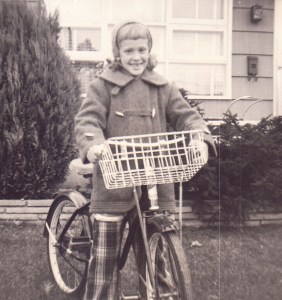Brenda wasn’t big on why her 7-month marriage ended while That Guy (or Poor Guy, as we started calling him) was trudging through the Mekong Delta. She announced it in a matter-of-fact letter that focused more on the logistics of shipping her clothes back to Massapequa and whether she was going to take a bus or a train home.
My vicarious thrill was over.
Once she got settled into college, she made Dean’s List right away. It was a sign that she would whiz past Jill and me in this forum, too, even though we had a head start. College meant the three of us found new friends, something we swore we’d never need.
Brenda and I lost touch for a while after graduation. Then, in our early 30s, there were phone calls once in a while. She had finished graduate school on the West Coast and had PhD after her name. I had Mrs. in front of mine. I was the mother of three, and had recently been named “Worst Housekeeper in Buffalo, New York” for the second straight year.
They were chatty, catching-up calls. She talked about academic journals. I had a few things to tell her about toilet training. Brenda said things like, “Ugh. . . I don’t know how you do it.”
I don’t think she meant that my life had turned into a minor Greek tragedy or anything, but even if she did, I could hardly blame her. When you have three kids under age 5 and you live in a place where it snows in April, you’re doughy, dry-skinned, and weepy for a while. You don’t want to be. It just happens.
Sometimes I felt she was calling from Pluto. I knew nothing about the majesty of the Palouse or the energy burst Downward Facing Dog gave you. Until she mentioned them, I’d never heard of The Green Party, a bodega, or going vegan. What I did know — the best way to get a kid to eat carrots — I learned to keep to myself.
In her mid-30s — wanting to be one step ahead of her ovaries going south on her — Brenda intentionally got pregnant. She was parenting her daughter alone. She traveled — to Africa and the Far East — where she took teaching jobs. There were still men.
Communication dribbled down to Christmas cards, filled with recaps of our busy year. Then maybe just a picture of our kids and an upbeat one-line greeting.
And then the cards stopped altogether.
Our mothers still lived in Massapequa, and they still ran into each other. I didn’t put up a fight when they conspired a little reunion in 1993 when Brenda and I would both be in town.
When the day of our reunion at my parents’ house arrived, I worked my mascara wand extra hard and fiddled with my hair. I practiced a few anecdotes I planned to dance out as if they’d just come to me. I could hear my family downstairs, even my brother who remembered Brenda and was curious to see how she’d turned out. I heard car doors closing outside.
“Here they come,” my brother called up the stairs.
“How does she look?”
“Ummm … well, you probably have time to do a few more sit ups.” I sucked it in as I came down the stairs. But I stopped when I relaxed in her hug.
We sat on the back deck and ate lunch. She had stories that made us laugh and made my father lean forward so he wouldn’t miss a word. He asked her about what she ate in Algeria. She talked about trying to fit into Japanese culture. My favorite story was a homogenized version of her latest romance, with a real cowboy in Wyoming.
At the end of the afternoon, Brenda and I wandered slowly to the base of my parents’ driveway, just the two of us. Right here, we had parked our bikes as kids. Right here, as teenagers, we picked out our children’s names and planned to live in houses next door to each other. And though we hugged, we were speaking different dialects now. And we knew it.
We said our goodbyes with promises to meet again. We never did.
Last year I was poking around online, and I found a book of poetry Brenda wrote. The cover is a black and white photograph of a naked woman’s back. She’s holding up her long hair and turning her face just slightly toward the camera. It’s her. It must have been taken when we were young and our backs were strong and powerful.
I stayed on the page a long time, just looking at her crazy brave profile and its sweet shadow.






